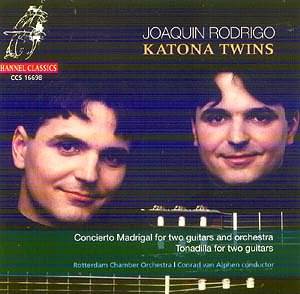 Composer: Joaquin Rodrigo
Composer: Joaquin Rodrigo
Works: Concierto Madrigal, Tonadillas
Performers: Peter & Zoltan Katona (guitars), Rotterdam Chamber Orchestra/Conrad van Alphen
Recording: De Doelen Rotterdam 10/00 & Doopsgezinde Kerk Deventer 01/01
Label: Channel Classics CCS 16698
Duration: 62 minutes
In the rich tapestry of 20th-century Spanish music, Joaquin Rodrigo stands as a towering figure, not least for his masterful Concierto de Aranjuez. Yet, as this fine recording by the Katona twins and the Rotterdam Chamber Orchestra illustrates, his lesser-known works merit equal attention. The Concierto Madrigal, composed in 1968, showcases Rodrigo’s penchant for intricate melodic variation, drawing from the Renaissance era’s emotive depth as epitomized in Arcadelt’s O felici occhi.
The Concierto Madrigal unfolds as a series of ten variations that elegantly traverse the landscapes of both the Baroque and contemporary Spanish styles. Here, the Katona twins—hailed for their extraordinary synchronicity—render the concerto with a precision that indeed feels like a single instrument. Their interpretation breathes life into Rodrigo’s delicate textures, allowing the lyrical lines to flourish while maintaining a cohesive dialogue between the guitars and the orchestra.
The orchestral color, masterfully executed by the Rotterdam Chamber Orchestra under Conrad van Alphen, adds a piquant richness to Rodrigo’s score. The use of woodwinds and strings complements the guitars, enhancing the dialogue without overwhelming the subtlety of the soloists. One particularly striking passage occurs in the seventh variation, where the interplay between the guitars and the orchestral strings evokes a gentle pastoral scene, reminiscent of the evocative imagery found in Rodrigo’s own Aranjuez.
The subsequent Tonadillas offer a delightful contrast, with their lighter, often whimsical character. Notably, “Songs of Farewell” (1935) emerges as a poignant tribute, laden with harmonic complexity that belies its simplicity. The Katona twins deliver these arrangements with a sensitivity that honors the original piano compositions while embracing the idiomatic qualities of the guitar. The tonal clarity they achieve in the opening of “The Grand March of the Subsecretaties” (1941) is particularly effective; the playful satire of bureaucratic chaos is rendered with a light-heartedness that resonates with the listener, making it a delightful highlight of the disc.
However, one cannot overlook the recording’s engineering choices. While C. Jared Sacks’ approach captures the intricate dialogues between the instruments, it tends to place the guitars in a somewhat prominent spotlight, which may overshadow the orchestral contributions for some listeners. A more naturalistic balance could have enhanced the listening experience, allowing for the nuanced interplay characteristic of Rodrigo’s vision. The anticipated superaudio/multichannel release may address this concern, potentially offering a more immersive soundstage.
Historical context enriches our understanding of these works. Rodrigo, who began composing during a tumultuous period in Spanish history, infused his music with a sense of longing and nostalgia. The Tonadillas, particularly those responding to the socio-political landscape of Franco’s regime, reveal not only a composer’s technical prowess but also a profound engagement with contemporary issues—a duality that the Katona twins navigate with commendable finesse.
In evaluating the overall quality of this recording, it is clear that the Katona twins bring both technical skill and interpretive depth to Rodrigo’s music. Their synergy, coupled with the Rotterdam Chamber Orchestra’s vibrant accompaniment, creates a compelling listening experience that invites both admiration and reflection. This recording, while perhaps not as universally recognized as the Concierto de Aranjuez, stands as a testament to Rodrigo’s broader oeuvre and the artistry of those who seek to illuminate it.
In conclusion, this release not only enriches the catalog of Rodrigo’s works but also serves as an invitation for listeners to explore the nuances of 20th-century Spanish music. The Katona twins, alongside the Rotterdam Chamber Orchestra, deliver a performance that is both technically astute and emotionally resonant, affirming that even within the shadows of Rodrigo’s more famous compositions, there lie treasures waiting to be discovered.